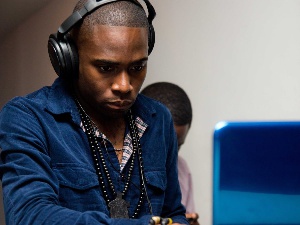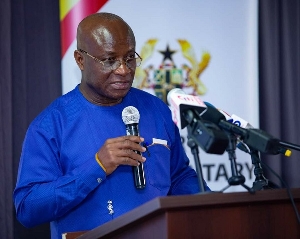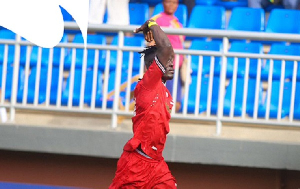The year 2013 was a revelation for afropop. At the time, Nigerian artists such as Davido and P-Square were releasing infectious club tracks that emanated directly from the high energy of life in Lagos; songs like “Skelewu” and “Personally” dominated local airwaves and then spread globally, waving the flag for Nigerian pop.
But 2013 was also the year that a new wave emerged: Mr Eazi, a Nigerian artist who had been promoting shows in Kumasi, Ghana, sent the vocals for one of his songs “Bankulize” to a British-Ghanaian DJ and producer in London. The two had just met on Twitter, and Juls, born Julian Nicco-Annan, reimagined the song. He slowed down its tempo and pared the beat down to a minimal, hard set of drums, contrasted with high melodic notes playing on emotions of longing.
Since “Bankulize” (named for the Ghanaian corn and cassava dish “banku”) was released quietly on a few Ghana radio stations in 2013. Since then, Eazi and Juls have collaborated on a number of hits that have helped propel Eazi to legitimate stardom.
Juls’ production combines highlife, dancehall, and hip-hop and can be credited with launching a new, minimalist afropop sound. Its influence can be heard everywhere today, from Runtown’s “Mad Over You”(arguably the biggest track in Nigeria last year) to Wizkid’s “Come Closer”featuring Drake. In crafting a singularly Ghana-influenced sound, Juls has succeeded where many others have failed: stealing a bit of afropop’s spotlight away from Nigeria.
We spoke with him over the phone from his home base in Hackney, East London, where he was gearing up to launch his first solo album, Leap of Faith, on May 8.
Tell me more about your background and how you first got into music.
Juls: My parents are Ghanaian immigrants who settled in the UK in the ’70s, so I was born in Hackney, East London, was raised there for a bit and then I moved up north to a place called Stevenage in Hertfordshire. My dad got a job, moved back to Ghana, so I did my junior high and secondary school there. During that time is when more musical experiences started happening. My dad was a big musichead, and all his brothers as well. Jazz, highlife, reggae were the kind of things we used to hear when I was young.
Did he play music as well?
No, but we used to go to all these jazz concerts, so music was quite big. My mom as well — her side is where I get more of the afro vibes because my mom listened to a lot of African music. She grew up in the western region of Ghana, and the sound out there is quite different and it’s an influence to me.
My production really started in my third year at the University of Legon in Ghana. I started messing with old-school samples and just trunking it up and trying to be like Kanye West or Just Blaze. And then I decided to get a bit different: I decided to sample African music like Fela Kuti or Tony Allen, or Ghanaian records like C.K. Mann, E.T. Mensah, or Gyedu-Blay Ambolley, just messing around, you know.
When did your work first start taking off?
In 2012 I did a song called “Feel Alright” with a group based in Nigeria called Show Dem Camp, which had a very highlife sound. That’s when the break happened. I think when I became more popular myself was when I connected with Mr Eazi. At the time, in 2013, he was doing the music thing but he wasn’t taking it as serious. I came across one of his old mixtapes called About To Blow, and I listened to a few songs and was just like, “Yo bro, I think you’ve got the potential to be something great. I want to remix this song called ‘Bankulize.’” So he sent me the vocals, I remixed it and that’s basically when things began. I was able to speak to my people back in Ghana so it could get radio play.
We connected on Twitter, and the first time we met was in 2015 at a party that I did in Ghana. After that, we did “Skintight” and “Hollup.”
Which are massive hits. How did you react when they blew up?
It was quite overwhelming. As a producer, you get tired of your songs, but those ones are still ringing bells. The songs I produced: “Bankulize,” “Skintight,” “Hollup,” “Shitor,” “Annointing” — those five records took him to the level that he’s at. It’s a proud feeling.
We were just riding the right vibe, which was mellow afrobeats, that minimalistic vibe. The average afrobeats song is quite fast, so I thought, “Let me slow down everything.” It’s still a vibe and you can jam to it as well.
When you first slowed down that afrobeats sounds and made it more mellow, how did that happen?
It was my girlfriend who made that happen. Because when we met, I was doing beats that were just rap music, and she’s never really been a fan of rap music. She loves to dance and have a good time, so she said I need to make music that people can dance and vibe to because that’s the only way that I’ll make a name for myself. She’s actually the one who influenced the production for “Bankulize” and “Skintight.” So I actually owe all this production to her.
Do you get mad at the label “afrobeats” to describe the music?
It’s just African music. We don’t have a genre in the major music platforms like Apple or Spotify, so everything is under “world music.” I’m hoping that one day we can create [a distinct tag for] “African music” but I think with this album, I’m putting it under the world because I want everybody to hear what Africa has to offer.
“I DON’T KNOW WHY IT’S JUST GHANAIAN AND NIGERIAN MUSIC THAT WE TALK ABOUT.”
It seems like all sounds across the diaspora are merging. It’s hard to tell whether the sound is coming from London, Accra, Jamaica, or New York because everything is mixing.
I think it’s kind of our fault because we never really claimed what was our own. There’s a lot of people listening to all sorts of genres and it’s good to listen to all sorts of music but I feel like we entirely do not support our own music as much as we should. It’s only when some big artist like Beyoncé and Drake is talking about it, then that’s when people want to say well, “African music is this, this, and that.” Because I guarantee you, from when I was raised in London, there was a point where Nigerians and Ghanaians, or Africans in general, were even shy to say that they were African. They would say they were Caribbean or just say they were British. The identity factor was so much of an issue, and then all of sudden it’s like Africans are doing alright now.
It’s kind of messed up that that’s how it is, obviously. But these people have heard the sounds that they feel they can capitalize on and make money on. It’s good for us because they will want to come to the source for that authentic highlife music. The thing is, there are some people who genuinely like the music for what it is, and there’s some people that are trying to make money from it. So those are the people that we need to be careful of, because we justmet those people, they came into our lives to push this thing that we’ve created. They’re going to take ownership of it and there’s nothing that we’ll be able to do about it apart from complaining.
Afrobeats is big in the UK now.
Afrobeats gets played on the radio now. For example, my new single “Bad” — which is not really an afrobeats song but has that afrobeats vibe and that Caribbean vibe — is getting played, and a lot of other songs are on mainstream radio in the UK.
Will that happen in the US as well?
Yeah! When I came to SXSW, there were a lot of people who came out and supported our afrobeats show. And I feel like they liked it, but there’s liking it and there’s really liking it, because people just jump on waves and when the waves dies they just leave you to dry. Afrobeats is the new wave, and it’s up to us Africans — the musicians, the producers — to take ownership of that. We shouldn’t let the same thing that happened to our forefathers happen to us.
There’s so much good music out there now, and everybody’s doing as much as they possibly can. Myself, Maleek Berry, Sarz, Legendury Beatz, MasterKraft — there are so many producers out there now who are doing so much for the African or Afrobeats genre. And of course Wizkid, Mr Eazi, Burna Boy, Davido, UG. Even in the UK, Yxng Bane, Kojo Funds, Ray Blk, Wretch 32, Nadia Rose, and Nonso Amadi. All these guys are bringing different vibes to different sounds and they’re being recognized.
Is there a difference between a Ghanaian sound and a Nigerian sound?
I think we just bite off each other. If you listen to Nigerian and Ghanaian music from the ’70s, it was pretty much the same. The only real difference is that we have our own slangs and the way we play our instruments. For example, you have the Lagbaja sound, which is a Nigerian sound, and you have the Amponsah sound, which is Ghanaian. They all sound African, but they’re different. So just combine the two and it works. I’m not really for the Ghana versus Nigeria music thing. That’s not my thing.
“WE’VE SEEN A LOT OF MUSICIANS COME AND GO.”
Mr Eazi said that “Ghana’s influence on present day ‘Naija Sound’ cannot be over-emphasized.” That caught a lot of heat.
I mean, what he said is true. But what Nigerians also need to remember is that it got to a point where Wizkid did a song called “Azonto,” and Azonto is a Ghanaian term. Ghanaians as well, we started saying “sha” and all sorts of Nigerian terms in our music. We bite from each other, it’s not about whose music is better and whatnot. It’s just good music, and I don’t know why it’s just Ghanaian and Nigerian music that we talk about. South African music is crazy, Zimbabwean music is crazy, Kenya and Ethiopia. Africa in general, the sounds are similar, we all have the same instruments, it’s just the style we play [that varies].
Where do you see yourself in five years? Where do you see the culture in five years?
I hope that I can be in music full-time and I’m able to feed my family with music full-time. I hope to be written about in the books as a producer who brought a different wave to the genre, that I’ll get opportunities to work with other artists genuinely for me, and not because other forces want me to do it. To take on things for me, and not the other way around.
My dream job is have my own label where African music is big. So that we can all do this for a lifetime. Because we’ve seen a lot of musicians come and go, and they’re not doing music anymore, they’re doing odd jobs. I want to remain in this industry as long as I possibly can. If it’s not production, it’s management or A&R, but music is my passion and that’s what I want to do for the rest of my life.
Click to view details



Entertainment of Wednesday, 10 May 2017
Source: theoutline.com

















